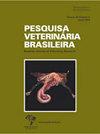巴西北部大德州里约热内卢马钩端螺旋体的血清流行率
IF 0.8
4区 农林科学
Q3 VETERINARY SCIENCES
引用次数: 3
摘要
摘要:本研究旨在了解巴西东北部大德州东、西波提瓜中部地区饲养的马中钩端螺旋体抗体的流行情况及其相关危险因素。从2018年到2019年,共使用了90家酒店的785只动物(785只)。血清学诊断采用显微凝集技术(MAT),使用由属于16个血清组的20个血清型组成的活抗原集合。从对牧场主进行的问卷调查中获得与危险因素相关的可变数据,并进行统计分析。绝对频率和相对频率通过描述性分析确定,危险因素通过单变量分析确定,必要时使用Pearson卡方检验和Fisher精确检验,然后使用Poison回归评估。动物阳性率为97.2%(763只),所有动物至少有1只血清阳性。反应性血清群以黄疸出血热为主(72.88%),其次为澳洲猪(14.94%)、Sejroe(4.43%)、Shermani(2.77%)、autumn nalis(1.29%)和Pomona(1.29%)。Canicola、Ballum、gripotyphosa和Hebdomadis血清群发病率低于1%,冠名≤400的病例占78.97%。血清学阳性马的大量出现和黄疸出血病血清群的优势突出了在Potiguares畜群设施中接种疫苗和保持卫生的重要性,以预防钩端螺旋体病病例,并由此消除环境中的病原体。本文章由计算机程序翻译,如有差异,请以英文原文为准。
Seroprevalence of Leptospira spp. in horses from Rio Grande do Norte, Brazil
ABSTRACT: This study aimed to determine the prevalence and risk factors associated with the presence of anti-Leptospira spp. antibodies in horses reared in the Eastern and Western Potiguar mesoregion, State of Rio Grande do Norte, northeastern Brazil. Seven hundred and eighty-five animals (785) were used from 90 properties from 2018 to 2019. The serological diagnosis was performed by the microscopic agglutination technique (MAT), using a collection of live antigens composed of twenty serovars belonging to sixteen serogroups. Variable data associated with risk factors were obtained from questionnaires carried out to herd owners and statistically analyzed. The absolute and relative frequencies were determined by descriptive analysis and risk factors by univariate analysis of the variables using the Pearson’s chi-square test and Fisher’s exact test, when necessary, and then assessed by Poison regression. The positivity frequency among animals was 97.2% (763), and from all properties, there was at least one seropositive animal. The main reactive serogroup was Icterohaemorrhagiae (72.88%), followed by reactive animals to Australis (14,94%), Sejroe (4.43%), Shermani (2.77%), Autumnalis and Pomona (1.29%). It was observed occurrences lower than 1% to serogroups Canicola, Ballum, Grippotyphosa and Hebdomadis, with titles ≤400 in 78,97% of cases. The significant occurrence of seropositive horses and the serogroup Icterohaemorrhagiae predominance highlights the importance of vaccination and hygiene in Potiguares herds facilities to prevent leptospirosis cases and the consequent elimination of the agent in the environment.
求助全文
通过发布文献求助,成功后即可免费获取论文全文。
去求助
来源期刊

Pesquisa Veterinaria Brasileira
农林科学-兽医学
CiteScore
1.30
自引率
16.70%
发文量
41
审稿时长
9-18 weeks
期刊介绍:
Pesquisa Veterinária Brasileira - Brazilian Journal of Veterinary Research (http://www.pvb.com.br), edited by the Brazilian College of Animal Pathology in partnership with the Brazilian Agricultural Research Organization (Embrapa) and in collaboration with other veterinary scientific associations, publishes original papers on animal diseases and related subjects. Critical review articles should be written in support of original investigation. The editors assume that papers submitted are not being considered for publication in other journals and do not contain material which has already been published. Submitted papers are peer reviewed.
The abbreviated title of Pesquisa Veterinária Brasileira is Pesqui. Vet. Bras.
 求助内容:
求助内容: 应助结果提醒方式:
应助结果提醒方式:


